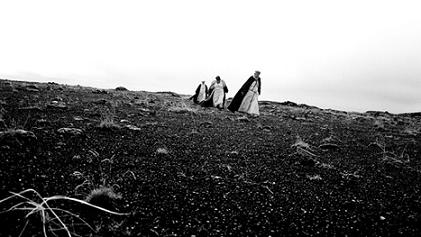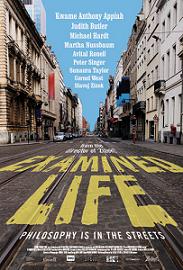Reviews for February 25th, 2009
Birdsong
Directed by Albert Serra.

In Catalan and Hebrew with subtitles. The Three Wise Men (Lluis Carbo, Lluis Serrat Batlle and Lluis Serrat Masanellas), a.k.a. the Magi or the Three Kings, travel across the desert and other landscapes to deliver gifts to the Christ Child. Dressed in a robe and a crown, they each tread slowly as if time were standing still. When they’re not walking in silence, they’re either engaged in small-talk about how to continue on in their journey or whine about the physically arduous elements that they’re experiencing. For example, they have steep slopes to climb on a mountain with lots of icy terrain. Will the ice support them or not? Then there’s a lengthy scene where they sleep beside one another and lean against each other while requesting for more space for comfort. Writer/director Albert Serra includes lush, picturesque cinematography with black-and-white images that gives the film a certain timeless quality and even some awe-inspiring visuals. He uses the mediums of sound and sight as a means to generate a very transcendent, quietly moving experience for the viewer rather than overwhelming you with preachy dialogue or drowning you in an intricate plot. Knowing the biblical story of The Three Wise Men from the New Testament might, admittedly, help you to understand the details of the minimal plot and why the Three Wise Men don’t have a name. The sounds include sounds from nature and one musical piece later on. Just like with other slow-paced, meditative films such as Into Great Silence and Silent Light, the silent moments speak more volumes than any of the other moments. Ultimately, at a running time of 96 minutes, Birdsong, will be mostly engrossing for patient viewers who’ll be able to truly appreciate the seemingly simple, minimal narrative and to sense the wealth of emotion and complexities lurking beneath it, especially when it comes to its gentle use of symbolism. Number of times I checked my watch: 2. Opens at the Anthology Film Archives.
Examined Life
Directed by Astra Taylor.

This compelling documentary focuses on the philosophies of nine modern thinkers and philosophers, namely, Judith Butler, Martha Nussbaum, Michael Hardt, Avital Ronell, Peter Singer, Sunaura Taylor, Cornel West, Kwame Anthony Appiah and Slavoj Žižek. Most of them talk a lot and actually say a lot while some of them talk a lot and actually say very little. Princeton Professor Cornel West, for example, while sitting in a cab, discusses how he believes in embracing “the funk” of life with all of its filth, stench and suffering, which, he claims, Jazz music arises from. In a particular moment of sharpness, he hits the nail on the head when he says that philosophers feel very much alive when buried in philosophical thoughts, much more so than the pedestrians walking around the city with virtually no deep thought. Pay close attention to Peter Singer’s ten-minute segment about shopping and ethics as he walks through New York City’s streets because it has more insight and truth about the way the average shopper thinks, or should think, than Confession of a Shopaholic says in 100 minutes. In another thought-provoking segment, Kwame Anthony Appiah talks about how human relations should not only between person to person, which most people are accustomed to, but between yourself and the cosmopolitan itself, which consists of everyone in the world regardless of nationality. While walking through a park, Martha Nussbaum discusses the concepts of social contract and state of nature that’s found in Niccolo Machiavelli’s The Prince and ties it to the ethical or unethical decisions that politicians make without being emotionally sensitive or critical about the decisions’ consequences on other people or the world as a whole. Slavoj Žižek, who was the subject of director Astra Taylor’s documentary Žižekgives a particularly interesting and articulate speech about modern ideology and ecology as he walks through the least aesthetic location to be filmed at: a dump. In one of the liveliest segments, Judith Butler walks through a neighborhood of San Francisco with Sunaura Taylor, her disabled friend, and converses with her about interdependency of everyone, regardless of whether or not they’re disabled. Michael Hardt, rambles on and on about how he almost joined a revolution and how one can be started in today’s capitalistic times. He’s among the two philosophers interviewed here who talk a lot, but take a while to actually say what they mean to say, so it feels a bit dull listening to him. The same can be said for Avital Ronell, who walks in a park while answer the question of whether or not it’s safe to say that philosophy is a search for meaning. She thinks to give something a strict meaning seems fascistic in a way. Her thoughts in general lack flow and clarity, perhaps because director Astra Taylor doesn’t stop her to ask her more questions and because she limits her onscreen time to roughly 10 minutes just like the other interviewees. Despite those two uneven, underwhelming segments, there’s still a lot of insight in Examined Life, especially for those who haven’t studied philosophy. For everyone those audience members who are already familiar with the works of John Locke, Thomas Hobbes, Denis Diderot, Niccolo Machiavelli, Plato or that of other philosophers from the Age of Enlightenment, the film merely scratches the surface of philosophy without digging too deeply. Nonetheless, at a running time of 88 minutes, Examined Life manages to be a mostly provocative and enlightening documentary with plenty of food for thought. Number of times I checked my watch: 1. Released by Zeitgeist Films. Opens at the IFC Center.
Main Page
Alphabetical Menu
Chronological Menu
______________________________________________________
|





